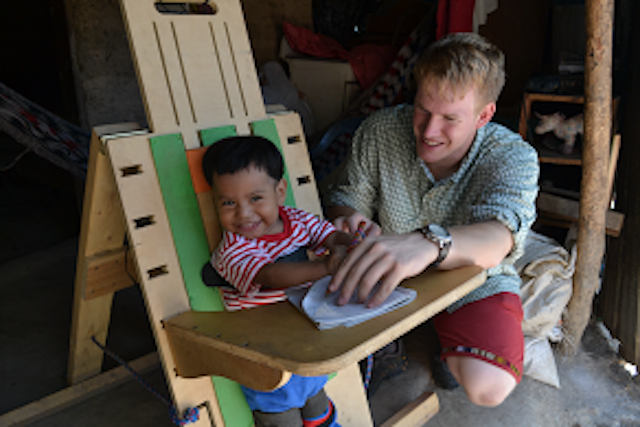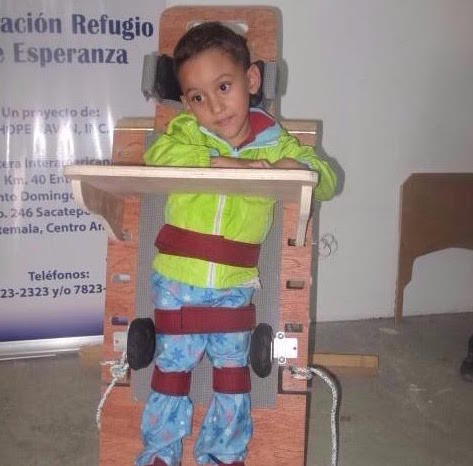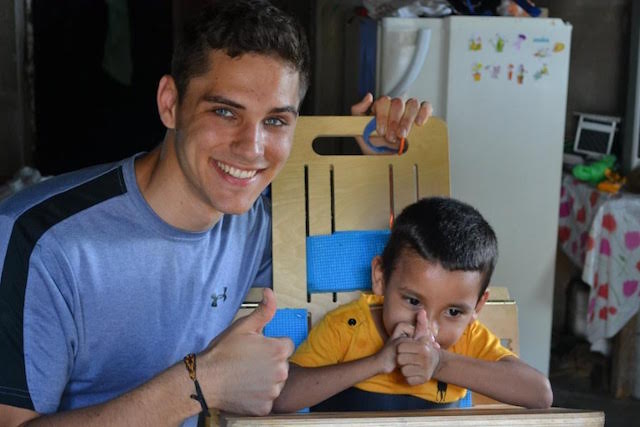Every second, a child is born with cerebral palsy (CP), the most common childhood disability.
A third of these children are unable to stand unassisted.
These were the statistics that flashed through my mind as I climbed a steep trail to a meet a family and their disabled son. At times, the embankment was so vertical that our team needed three points of contact to ensure we didn’t fall. It was these home visits that revealed the daunting challenges faced by parents and their disabled children in underserved, isolated communities.
We were there as part of a small team from Dartmouth College, and spent three months working in Peru, Honduras and Guatemala to help mitigate the effects of CP and other childhood disabilities. The team consisted of a Thayer bioengineering student, a 17-year-old high school engineering student, and myself.

We established factories that now produce pediatric standing frames, using locally sourced materials. The standing frames support disabled children in an upright position, facilitating their physical development and social inclusion. The factory we worked with in Guatemala is now set to produce over 330 new standing frames per year, employing carpenters who are themselves in wheelchairs.

Through this work, I saw how families face huge challenges with few sources beyond their love and commitment.
Back to the story. Minutes after climbing the hill, I found myself struggling to hold a screaming, flailing, nonverbal nine-year-old as he was being placed in his standing frame. I was already winded from the hike. It was then that his mother’s dedication hit me. She would carry her son, as he violently resisted, along that same trail three days a week to bring him to physical therapy. Once they reached the road, she spent her scant resources on a taxi to get to the therapist’s office where she learned exercises to do with her son at home.
Dostoyevsky and Dickens wrote extensively about those who struggle to make the best of unforgiving circumstances. They wrote of love as a practice—as a verb. Witnessing it in action was more difficult than I had imagined. Survival is not an intellectual aspiration; it’s the way we meet the hand we are dealt. We make sense of the world through our experience in it, from our communal stories.
One family I met believed their child’s CP was the result of a Mayan curse. Ultimately, the etiology of the disease was irrelevant. What mattered was how the families faced each day, where love necessarily manifests as commitment. There is nothing romantic about the quiet determination of destitute parents; it makes me wonder about the stories we all tell ourselves.
As an agnostic, it was difficult to understand the role religion played in these communities. How could you love a God who is apparently so indifferent to suffering? It was jarring to walk into churches that doubled as orphanages and see disabled children kept in large cage-like structures.
But it didn’t take long to see that this was a kindness, an effort to provide support and care in an already struggling community. Where poverty forces the vulnerable to exploit the vulnerable, many of our patients placed their hope for peace and justice in the next world.
I explored the tension between our patient’s faith and pain in the confrontation of the brothers in Dostoyevsky’s The Brothers Karamazov. The uneducated but devout younger brother Alyosha and the elder, atheist lawyer Ivan argue for and against the existence of God. The lawyer says that there cannot be a God (or one worthy of praise) because the suffering of the innocent is unjust, and uses an example of a hurt child. Alyosha simply points out that it is not God who is responsible for such suffering, but humanity. He gently suggests that each day we wake up and tolerate a world where there is unjustified suffering without working to alleviate it, we are complicit.
Whether hope is divine or earthly, it sparks action to face the darkest aspects of our world.
In the face of urgent need, there is no perfect plan of action. To embrace uncertainty and rebel against the idea of perfect preparedness is prerequisite. Progress would never be made if everyone waited for three degrees and five years’ work experience before addressing the issues that move them.
Today, we have standing frames in Guatemala, Peru, Honduras, China, North Korea, Belize, Zambia and Kenya. The need outstrips our ability to produce, but with every new standing frame that physical therapists place with a child in need, one more family will have the tools to aid healthy development.
Maybe the next child who receives one will be climbing the furniture within a year, or know the joy of playing with something as simple as a plastic bag.
Progress is both difficult and meaningful.
Being back in Lima, visiting the hospital, clinics and orphanage we worked with a year ago, I am humbled by this city on the sandstone cliffs, facing both the South Pacific uncertainty with ingenuity and grace.
“The mystery of human existence lies not in just staying alive, but finding something to live for.” ~ Fyodor Dostoyevsky
Author: Emily Donaldson
Image: Author’s own
Editor: Callie Rushton









Read 0 comments and reply